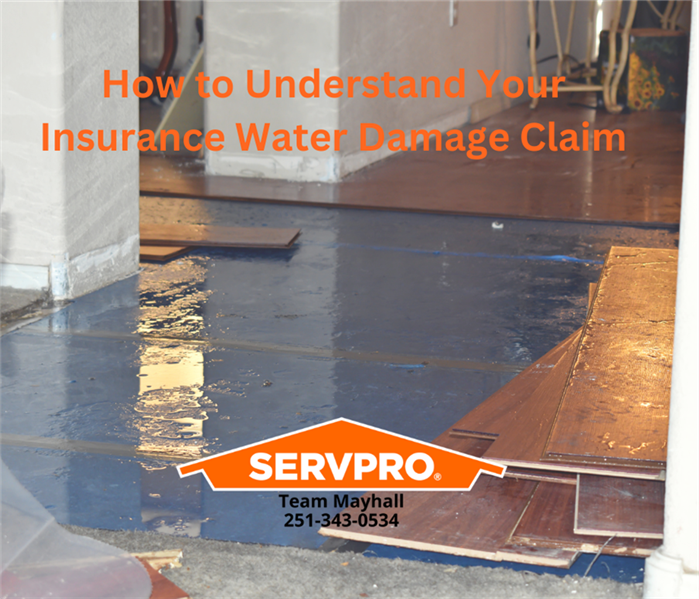Understanding Water Damage and Homeowners Insurance
10/30/2024 (Permalink)
How to Understand Your Insurance Water Damage Claim
Water damage is a common issue that many homeowners experience. With estimates that about 1 in 60 homes will file a water damage claim each year. There are many reasons that cause water damage in a home like such as, due to a burst pipe, a failed washing machine hose, or a leaking roof, it’s important to know if your homeowner's insurance covers the damages. Here’s what you should know about insurance in seven common water damage scenarios:
- Leaking Pipes One of the most common causes of water damage in homes is leaky pipes. As pipes age, they can develop cracks or holes, resulting in leaks that may go unnoticed for weeks or months. This can lead to significant damage to walls, floors, and ceilings. Leaks in crawl spaces can also create excess moisture, resulting in musty odors, pests, and wood rot. To prevent this, regularly inspect your pipes for signs of leaks and address any issues promptly.
Frozen Pipe Burst
In extremely low temperatures, pipes can freeze and burst, leading to water leaks in your home. Most homeowners insurance policies cover the resulting damage unless negligence is involved—such as leaving your home unoccupied without heat.
Backyard Pool Leak Affects Lawn and Basement
Typically, swimming pool leaks are not covered by homeowners insurance unless caused by an external factor, like a fallen tree. While damage to your basement and personal property is generally covered, damage to your lawn usually is not.Washing Machine Overflow
Water damage from appliances is often covered if the leak is sudden or accidental. However, if the washing machine overflow is due to lack of maintenance, coverage may be denied. Regularly inspect water supply hoses and replace any frayed ones to prevent issues.Sewer Backup
Standard homeowners insurance does not cover sewer backups. However, you can purchase additional endorsements for sewer and drain coverage. Here are some suggestions on how to prevent sewer backup.Flooding from Natural Disasters
Flood damage is typically not covered by standard homeowners policies. Floods can result from storms, overflowing rivers, or saturated ground. To insure against water damage from natural disasters, you need to obtain a separate flood insurance policy. Learn more at The National Flood Insurance Program.Water Seepage Beneath the Home Foundation
Water seeping into the basement from beneath the home is not covered by homeowners insurance, as this type of damage is considered a maintenance issue rather than sudden or accidental.Roof Leaks During Rainstorms
If the roof was poorly maintained prior to the leak, damage may not be covered. However, water damage to personal belongings is usually covered, depending on your specific policy.
How to Report a Water Loss Claim
If you experience water damage, follow these steps to report a claim to your insurance:
Document the Damage: Take photos or videos of the affected areas, including any standing water and damaged belongings.
Contact Your Insurance Agent: Call your insurance agent as soon as possible to report the claim. Provide them with details about the incident and the extent of the damage.
Fill Out Necessary Forms: Your insurance company may require specific forms to be completed. Make sure to provide all requested information.
Keep a Record: Document all communications with your insurance company, including dates, times, and the names of representatives you speak with.
Follow Up: Stay in contact with your insurance adjuster to ensure your claim is progressing.
When to Contact SERVPRO of Mobile County
Reach out to SERVPRO of Mobile County immediately after reporting your claim. We can help you with the following:
Assessing the Damage: Our team will conduct a thorough assessment of your property and the extent of the water damage.
Starting the Cleanup Process: We’re available 24/7 to begin the cleanup and restoration process to minimize further damage.
Steps SERVPRO® Takes for Water Damage Cleanup
When you contact SERVPRO, here’s what we do:
Initial Inspection: Our professionals will assess the damage and identify the source of the water.
Water Removal: We will use powerful pumps and vacuum systems to remove any standing water quickly.
Drying and Dehumidification: Specialized drying equipment will be installed to remove moisture from the air and affected materials. We monitor humidity levels to ensure effective drying.
Cleaning and Sanitizing: We clean and sanitize all affected areas, including belongings, to prevent mold growth and ensure a safe environment.
Restoration: Once the area is dry, we will begin restoring your home to its preloss condition, which may include repairs or rebuilding.
Ongoing Communication: Throughout the process, we maintain communication with you and your insurance adjuster to ensure everything is documented and the claim is handled smoothly.
As an IICRC Certified Firm, our team follows industry-leading IICRC protocols for water damage restoration, ensuring that your property is handled with the highest level of professionalism and care.
For professional water damage repair or mold removal services, contact SERVPRO of Mobile County today! We’re here to help you navigate the recovery process and restore your home.






 24/7 Emergency Service
24/7 Emergency Service
